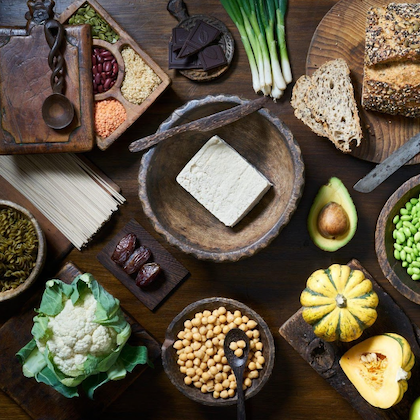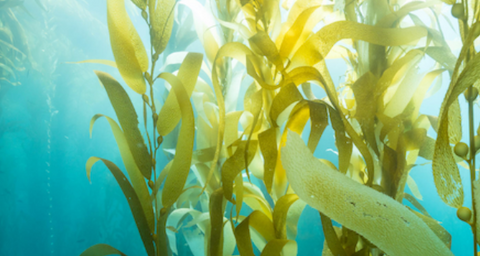
Essential Nutrients and Supplementation: A Vegan Diet Guide
Share
Research has shown that a vegan diet, when well-planned to include a wide variety of whole foods, can be a nourishing and health-promoting diet. A balanced, whole food vegan diet has been shown to lower the risk of a swathe of chronic diseases including heart disease, diabetes, generalized inflammation, and even certain cancers. However, there are certain essential nutrients that can be hard to get enough of if one isn’t careful. Knowledge is power, so let’s take a look at some of the nutrients that we need to get from our diet and how we can get enough of these nutrients for optimum health and wellness.
Choline: a key ingredient in cellular and nervous system health
Choline is one of the lesser known essential nutrients, and it’s estimated that about 90% of Americans don’t get enough of it each day. Choline is necessary to make acetylcholine, a major neurotransmitter that’s used throughout the nervous system to transmit nerve impulses throughout the body. It’s also used in various cellular functions, and is even used alongside certain B vitamins to synthesize DNA. Choline deficiency can result in muscle damage, liver damage, and non-alcoholic fatty liver disease.
The foods containing the highest concentrations of choline are animal proteins including meat, poultry, fish and whole eggs. However, there are smaller amounts of it in certain plant foods including cruciferous vegetables, shiitake mushrooms, quinoa, wheat germ, red potatoes, kidney, lima, and soybeans. It’s important to note also, that because choline is so widely used in the body, we need to take it in on a daily basis. If you’re not getting enough of the following foods each day and are wanting to stick with a purely vegan diet, you may want to look into taking a supplement to make sure your body is getting adequate amounts of this essential nutrient.
Here’s an idea of what foods you’d need to eat in a day to meet your minimum choline requirements. (RDI is recommended daily intake)
Option 1 Option 2
20% RDI from shiitake mushrooms, 1 cup 8% RDI from quinoa, 1 cup
40% RDI from soybeans, 1 cup 10% RDI from kidney beans, 1 cup
30% RDI from wheat germ, 3 oz 10% RDI from red potato, 1 large (with skin)
10% RDI from cauliflower, 1 cup 5% RDI from almonds, 2 oz
As you can see, it can take a good amount of specific plant foods to make sure you are getting enough choline on a daily basis. If you choose not to eat animal proteins, make sure to include foods with higher levels of choline like beans or lentils, wheatgerm and shiitake mushrooms on a daily basis. Otherwise you might want to consider supplementation. Be sure to check out our recipes for plant-based pasta, or our breakfast quinoa bowl for some ideas on how to incorporate these choline-rich foods into your diet.
Essential minerals: Iodine
Iodine is an essential mineral that’s important for the healthy functioning of the thyroid gland, which is responsible for production of certain hormones in the body that regulate metabolism and in children, brain development. Studies also show that iodine is involved in regulation of the immune system. Deficiency of iodine can cause a goiter, or swelling of the thyroid gland, as well as reduction in thyroid hormone production, which can cause hair loss, fatigue, weight gain, dry skin, and increased sensitivity to cold.
One of the easiest ways to get the recommended daily intake of iodine is through consuming iodized salt. Just ½ to ¾ teaspoons of iodized salt contains the entire daily recommended dose of iodine for an adult. But can you get your RDI of iodine from other, food-based sources?

Good news for vegans: you can get your entire RDI of iodine from seaweed! Just 3 tablespoons of nori (the type of seaweed used in sushi rolls) contains over 100% of the RDI of iodine. If you enjoy making soup, you can use kombu in a broth or soup to get your iodine. One sheet of it contains almost 2000% of the recommended daily amount! Do note, if you have a thyroid disorder, definitely consult your health practitioner before incorporating seaweeds into your diet, as too much iodine can be a concern, especially with autoimmune disorders like Hashimoto’s thyroiditis. Iodine is also found in seafood, eggs, and dairy products in lower concentrations.
If you’re not a fan of seaweed, then you may want to consider having iodized salt on hand. But, otherwise, this nutrient is fairly easy to get enough of and usually only requires supplementation in certain specific cases (often during pregnancy). At Organic Pharmer, we use kombu in all of our soups for its tasty umami flavor, its nutritional value, and because it can aid in digestion through its enzymatic breakdown of carbohydrates in the gut.
Essential minerals: Calcium
One of the more well known minerals, calcium is necessary for the production and maintenance of healthy bones and teeth. It’s essential for cardiovascular health as well. It works as a signaling molecule involved in the electrical activity of the heart to keep it pumping regularly, and it’s used as a signaling molecule in the central nervous system as well.
Calcium is found in relatively small amounts in plant foods, so it’s good to get a wide variety of greens, cruciferous vegetables, beans, nuts and seeds to get adequate amounts of this vital mineral. Here’s an example of what you could eat in a day to meet the RDI requirements for this nutrient.
- Almonds 10% RDI per ¼ cup
- Navy beans 13% RDI per 1 cup
- Soybeans 18% RDI per 1 cup
- Tahini 13% RDI per 2 Tbsps
- Collard greens 26% RDI per 1 cup (cooked)
- Orange 7% RDI per 1 medium sized fruit
- Blackstrap molasses 18% RDI per 1 Tbsp
If you’re worried about getting enough calcium on a daily basis, supplementation may be a good idea. However, if you already drink store bought plant-based milks, it’s good to remember they may be fortified with calcium, so you may not need to spend the extra money on a supplement in this case. For example, 1 cup of plant milk can provide 30% RDI of calcium. So take a look at how you’re eating on a regular basis, and see if fortified foods or supplementation is a good idea for you.
Essential minerals: Iron
Iron is essential for the creation of blood cells in the body. Within red blood cells, it binds oxygen and is responsible for the delivery of oxygen to tissues throughout the body. Iron also plays an important role in regulation of the immune system. Too much or too little iron can result in increased risk of infection. It is possible to get too much iron, so proceed with caution if you’re considering supplementation and only do so if you know you are at risk of deficiency and with the help of your healthcare provider.
Vegan diets only provide non-heme iron sources, which are absorbed less readily than animal sources of iron. Compounds called oxalates, phytates, and polyphenols prevent absorption of non-heme iron in certain plant foods including grains, legumes, and dark leafy greens. For this reason the Institute of Medicine recommends that people on plant-based diets consume 1.8 times more iron than those who eat meat. It’s also important to note that females are at a higher risk of iron deficiency due to the blood loss from monthly menstruation. Interestingly, consuming iron containing foods along with vitamin C can help increase the absorption of iron from these foods.
For males the RDI of iron is 14mg, and for females it’s 32mg. Here’s an example of what you might eat to reach these dietary recommendations.
Male Female
- 1 cup navy beans 4.3mg 1 cup navy beans 4.3mg
- 2 Tbsps tahini 1.3 mg 2 Tbsps tahini 1.3 mg
- 1 cup swiss chard 3.9mg 1 cup swiss chard 3.9mg
- 1 cup quinoa 2.8mg 1 cup quinoa 2.8mg
- 2 Tbsps blackstrap molasses 1.9mg 2 Tbsps blackstrap molasses 1.9mg
- 1 cup black olives 8.5mg
- 1 cup canned coconut milk 7.5mg
- 1 cup brussel sprouts 1.8mg
Talk to your Healthcare Provider

No doubt all of this information can be a little overwhelming at times. Getting enough of all of your essential nutrients is super important for maintaining a healthy body and lifestyle when choosing a vegan diet. That’s why it’s good to have a healthcare provider on your team. Functional medicine doctors are specially trained in nutrition and preventative medicine, and are well equipped to help determine your nutritional needs.
Even if you feel like you have a good idea of what foods you need to eat on a daily basis to get all of your nutrients, it can still be a good idea to see a healthcare professional to make sure that there are no gaps in your meal planning. Also, even if you are eating well, it can be a good idea to undergo lab testing to make sure that your internal reality reflects what you’ve been taking in. Gut issues can result in malabsorption, meaning even though you’re eating enough of the right things, it’s not getting into your body and your tissues. A good functional medicine doctor can help determine if this is the case for you, and help you navigate the problem to find health solutions that are right for you.
It’s important to note that supplementation, while it might seem like a good idea, should be done selectively and with care as research has shown that getting too much of certain nutrients via supplements can actually be harmful. It’s important to do your research, and consult with your healthcare provider, to make sure that if you do take supplements, that they are of a good quality and in a particular chemical form that the body will be able to absorb and utilize. Often nutrients in their natural form, i.e. derived from food, are in a state that is much easier for the body to take in and utilize than when derived from supplements. Another reason to eat a well balanced plant-based diet.
When in doubt, it can be good to have items like our Healing Soups or Gluten Free Bakery Items on hand, to take the guesswork out of your nutrition. Designed by macrobiotic chefs and our founding doctor, Dr. Susan Blum, you can be sure that you’re getting the nutrients and fuel that you need in our products. So do yourself a favor and keep some of our products in your pantry for stress-free meal prep. Your body, mind and gut will thank you for it!

About Author: Stephanie is the current fulfillment director and kitchen supervisor for Organic Pharmer. She studied Neuroscience at University of California, Irvine before studying Naturopathic Medicine for 2 years at National University of Natural Medicine in Portland, Oregon. She also spent 3 years studying East Asian Medicine at the same university.
